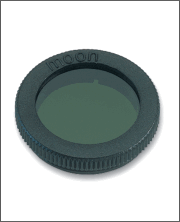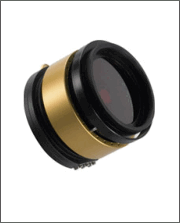|
Telescope FiltersTelescope filters selectively block and transmit portions of the visual spectrum and by using them you will appreciate the enormous difference in the level of detail you can actually see in astronomical objects. Filters are without doubt an invaluable aid in both lunar and planetary observation as they reduce glare and light scattering. They increase contrast through selective filtration, increase definition and resolution, reduce irradiation and lessen eye fatigue.
Of course, how effective the filter is will depend on a number of factors, most notably: the aperture and focal length of the telescope, the magnification being used, and the viewing conditions.
Using a Moon Filter will cut down glare and bring out much more surface detail, give you better contrast, and make for more comfortable viewing.
Astronomical telescope filters work by blocking out certain colors in the visible spectrum of light. A red filter, for example, will block out all but the red wavelength of light. Coloured filters, typically red, green, blue and yellow are good for observing the planets. By swapping the filters the different colours will bring out different details in the planets such as in Jupiter's cloud belts. If you take a look at an object that is primarily red while using a red filter, the object will appear very bright. Areas which are not red will appear more clearly because they contrast with the wavelength of light which is being passed by the filter Light Pollution Reduction Filters are designed to selectively reduce the transmission of certain wavelengths of light, specifically those produced by artificial light. This includes mercury and both high and low pressure sodium vapor lights. In addition, they block unwanted natural light caused by neutral oxygen emission in our atmosphere. As a result, these filters darken the background sky, making deep-sky observation and photography of nebulae, star clusters and galaxies possible from urban areas, (not suitable for lunar, planetary or terrestrial photography).
Then there are Solar Filters for observing the Sun. The purpose of a solar filter is to enable you to look directly through the telescope at the Sun. The filter has to eliminate infra-red radiation emitted by the Sun and reduce the amount of visible light to an acceptable level. Solar filters come in many different types and should be used with extreme caution, making a mistake here could result in permanent eye damage. Ensure you get all the information you can before proceeding to use one.
There's also an easy way to change the filter you want for observing or photography.With a 5-Filter wheel, it is possible to change filters without having to remove your eyepiece or camera. All you do is rotate the wheel and your filter securely clicks into place, ready for you to use. You don't even need to leave the eyepiece. Eyepiece And Filter Kit Buying filters and eyepieces separately can be both time-consuming and expensive, when what you really want to be doing is viewing. Zhumell offer an 1.25" Eyepiece and Filter Kit which includes all you require if you're just starting out or even if your adding to your collection. Baader Filter amongst the most effective and economical tools for the amateur astronomer. Celestron Filters Celestron Moon Filter Orion Moon Filter Lumicon Filters Meade 4000 Filters Skywatcher Filters Solar Filters Meade SolarMax Filters Zhumell Filter Set Return From Telescope Filters To The Telescopes Home Page
|








